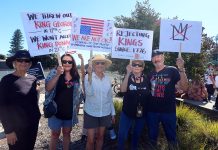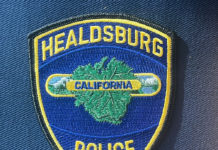WMS workshop gives student leaders tools to reduce
violence
by PAUL HILKER – Staff Writer
Agents of change are loose in Windsor — but it has nothing to
do with politics or the redistribution of wealth.
Student leaders at Windsor Middle School went through a two-day
training session that school officials hope will create a middle
school culture where more tolerance and less violence exists on
campus.
Instructors from a non-profit Sebastopol based organization,
called Community Matters, came to the campus last month for a
two-day training session on how to become a “safe school
ambassador.”
“We are trying to engage, empower, and equip kids for their role
in creating a safer school environment,” said the program’s
director, Chris Pack.
Thirty-six students chosen by WMS faculty members for their
responsible reputations gathered in the school library to
participate in discussions, skits and role-playing activities.
According to Pack, the students that are chosen are “opinion
leaders.”
“The students that were chosen are really the leaders of the
different cliques on campus,” said Pack. “We try to get
representation from each of the different student groups.”
Throughout the two days, concepts such as empathy, tolerance and
respect for other students were taught.
“This is going to be a great program for us,” said WMS Principal
Loren Barker. “The kids are coming out of their comfort zones and
learning to be confident and active.”
“The program is meant to be a challenge,” said Pack. “It can be
emotionally hard because they are being asked to go against the
crowd. We’re asking them to be agents of social change.”
On the first day, students got to know one another by
participating in ice-breaker activities.
One activity called “crossing the line,” initiated an openness
and sense of trust among the students, according to Pack. Students
stood facing each other in two lines while a list of students’
statements were read by instructors.
Some of the statements included: “I have been involved in a
fight at school,” “My family comes from Mexico,” and “I have
bullied someone before.”
According to Pack, this activity gives the students a chance to
declare things about their heritage and themselves.
“This was cool because we got to see what everyone was like on
the inside,” said Summer Morgan, one of the students chosen for the
program.
Other activities included small group discussions and skits
aimed at teaching techniques on how to deal with potentially
violent circumstances.
“Kids can intervene in these situations in ways that adults
can’t,” said K’vod Wieder, a trainer/instructor in the program. “We
train them in ways to deal with situations that may seem
impossible.”
Prevention, mediation and support are key concepts taught in the
program. “We want to give them tools that they can use so that they
don’t need to remain silent when they experience harassment or
bullying,” said Pack. “Silence is consent. At the same time, we
want to teach them to have discernment.”
When asked if she learned anything from the program, Morgan
replied “I’ve learned that no matter what kind of trouble people
are going through, you can always help them in some way.”
To ensure that the program is ongoing and that the students
maintain an attitude of activism, group meetings will be held
weekly at WMS to encourage the students in the program.
“We will have ‘family group’ meetings where the students,
parents, and some faculty can discuss the goals and progress of the
program here at WMS,” said Barker.
Besides these meetings, the 36 students who participated will
keep an ongoing “data sheet” which will help faculty and
administrators determine how much of a problem bullying really
is.
“A big part of the program is making sure that these ideas are
established well so the teachers and administrators can maintain it
in the future,” said Pack. “We’re giving these kids a sense of the
potential and the power they have for change. Hopefully, they will
take the ball and run with it.”








